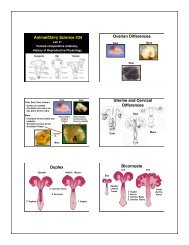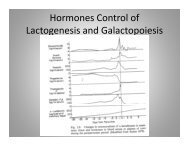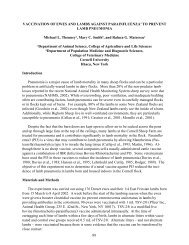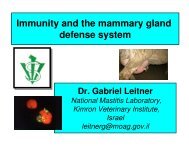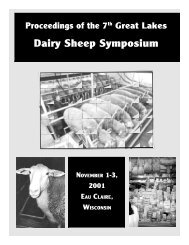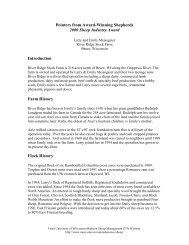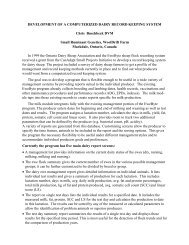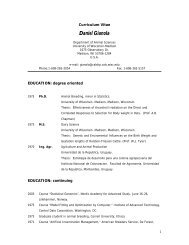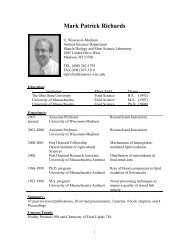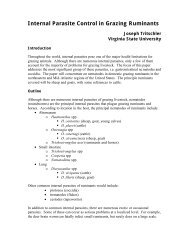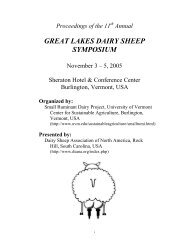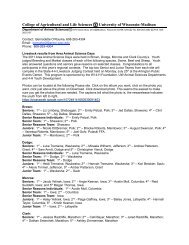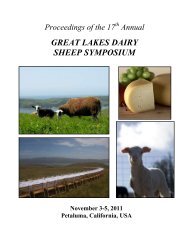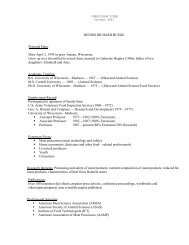great lakes dairy sheep symposium - the Department of Animal ...
great lakes dairy sheep symposium - the Department of Animal ...
great lakes dairy sheep symposium - the Department of Animal ...
Create successful ePaper yourself
Turn your PDF publications into a flip-book with our unique Google optimized e-Paper software.
Organic Milk Production Requirements<br />
Most <strong>sheep</strong> <strong>dairy</strong>ing is a relatively low-input farming system. Especially grass-based systems<br />
will have relatively few major changes to convert <strong>the</strong>ir herds to organic production. However, a<br />
few <strong>of</strong> those changes represent significant alterations in management perspective. The major<br />
challenges in organic <strong>sheep</strong> milk production may be access to pasture, feeding lambs, parasite<br />
control and production or purchase <strong>of</strong> organic feed.<br />
Because organic production systems are limited in <strong>the</strong>ir use <strong>of</strong> non-natural inputs, <strong>the</strong> focus<br />
<strong>of</strong> <strong>the</strong> farm activity must be on preventative management - creating environments where<br />
problems are least likely to happen. This concept relates to feed and pasture production as well<br />
as animal health and management. The basis <strong>of</strong> any successful organic system, animal or crop, is<br />
through effective soil management. This involves supporting diverse soil biology, balancing<br />
minerals and improving soil organic matter. With a focus on improving soil, feed quality will<br />
improve and ultimately, animal health will become optimized, reducing <strong>the</strong> need for health<br />
interventions. Many farmers who have transitioned to organic animal management systems are<br />
amazed by <strong>the</strong> long-term improvements in animal health, reduction in veterinarian visits and<br />
improved longevity <strong>of</strong> <strong>the</strong>ir herds or flocks. <strong>Animal</strong> health relies on building <strong>the</strong> animals’<br />
immune system so that a natural reaction can fight <strong>of</strong>f <strong>the</strong> common hazards and infections. An<br />
animal with a compromised or weak immune system will fall prey to things a robust animal will<br />
fight <strong>of</strong>f. Stress is a significant catalyst to injury or illness, and all management practices should<br />
be planned to reduce flock and individual animal stress. Breeding and selection for disease and<br />
parasite resistance is a valuable tool in organic systems.<br />
The basics <strong>of</strong> an organic <strong>dairy</strong> system:<br />
1. Organic management for one year before <strong>the</strong> sale <strong>of</strong> organic milk. This involves feeding<br />
100% certified organic feed (including pasture) or feed in its third year <strong>of</strong> transition from<br />
your own farm.<br />
2. Only organic grains and forage. No GMO feed.<br />
3. <strong>Animal</strong>s must have access to pasture, representing a significant percent <strong>of</strong> feed intake as<br />
seasonally appropriate. Pasture must be certified organic (3 years <strong>of</strong> only approved<br />
practices).<br />
4. The entire flock must be transitioned at one time, animals may not be taken in and out <strong>of</strong><br />
organic production.<br />
5. No non-approved practices for health care. Vaccines are allowed, antibiotics are not<br />
allowed*, chemical wormers only in emergencies, no routine use. Herbal health products,<br />
homeopathic remedies, etc. allowed as long as <strong>the</strong>y do not include non-approved<br />
materials, such as fillers or flowing agents. (see resources) (*antibiotics must be used if<br />
<strong>the</strong>y are seen as <strong>the</strong> only way to save an animal’s life. If antibiotics are used, however,<br />
<strong>the</strong> animal must be taken out <strong>of</strong> organic production or sold, and will only produce nonorganic<br />
milk after this time.)<br />
6. Natural parasite control, involving proper pasture management and animal rotation and<br />
allowed herbal or mineral formulations. For more information see “Internal Parasites and<br />
Ruminants: Organic Answers.”<br />
http://www.mosesorganic.org/broadcaster/13.6intparisites.htm<br />
15



